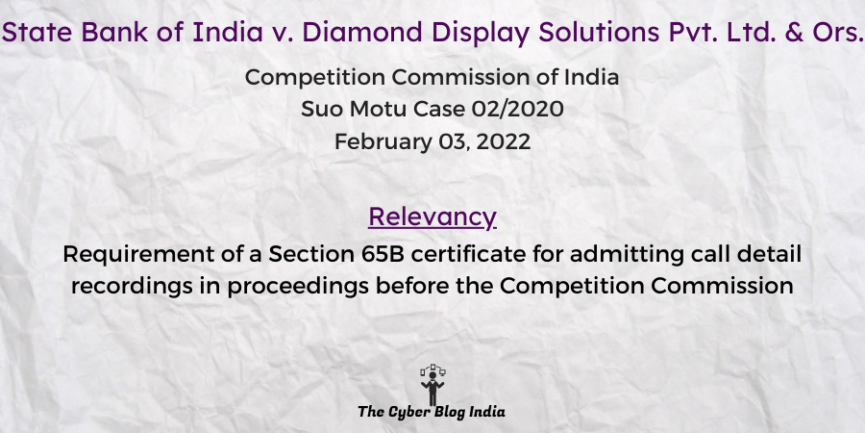State Bank of India v. Diamond Display Solutions Pvt. Ltd. & Ors.

State Bank of India v. Diamond Display Solutions Pvt. Ltd. & Ors.
In the Competition Commission of India
Suo Motu Case 02/2020
Before Mr Ashok Kumar Gupta, Chairperson, Dr Sangeeta Verma, Member, and Mr Bhagwant Singh Bishnoi, Member
Decided February 03, 2022
Relevancy of the case: Requirement of a Section 65B certificate for admitting call detail recordings in proceedings before the Competition Commission
Statutes and Provisions Involved
- The Competition Act, 2002 (Section 3(1), 3(3), 27, 48)
Relevant Facts of the Case
- The Commission directed the Director General (DG) to investigate a complaint alleging bid-rigging and cartelisation in the tender floated by SBI Infra Management Solutions Pvt. Ltd.
- The complaint stated that certain bidders in the tender coordinated amongst themselves and fixed the prices of their services.
- In the investigation, the DG concluded that the opposite parties had indulged in anti-competitive conduct to rig the tender.
- The Commission considered the DG’s Investigation Report and directed the parties to make the submission.
Prominent Submission by the Parties
- The first opposite party’s counsel admitted the findings of the DG’s investigation. However, he objected to the conclusion that the first opposite party was responsible for the coordination amongst other opposite parties.
- The second opposite party’s counsel submitted that her client’s communication with other opposite parties regarding the SBI tender violated the existing laws. However, after the bidding process was complete, the second opposite party ceased to commit such acts.
- The third opposite party’s counsel admitted that his client headed the arrangement as they would gain the most from the tender. His client would supply the materials used for executing the works covered in the tender.
- The fifth opposite party’s counsel contended that the call detail records relied on by the Director General are not admissible. This is because of the non-fulfilment of conditions for admissibility under Section 65B of the Indian Evidence Act, 1872.
Opinion of the Bench
- The opposite parties meticulously planned the exercise and jointly fixed the bidding price. They have rigged the bids in the impugned tender and geographically allocated the markets. They renamed the Excel sheets to tutorial to hide the bidding sequence.
- As for the fifth opposite party’s submission on the validity of call detail records, the Commission noted that they neither denied nor disputed calls between their and the first opposite party’s representatives.
Final Decision
- The opposite parties’ conduct has violated the provisions of the Competition Act. The Commission imposed a monetary penalty on the parties for their anti-competitive conduct.
Satvik Mishra, an undergraduate student at the Rajiv Gandhi National University of Law, Punjab, and Srikari Ammanamanchi, an undergraduate student at the NALSAR University of Law, prepared this case summary during their internship with The Cyber Blog India in May/June 2022.
